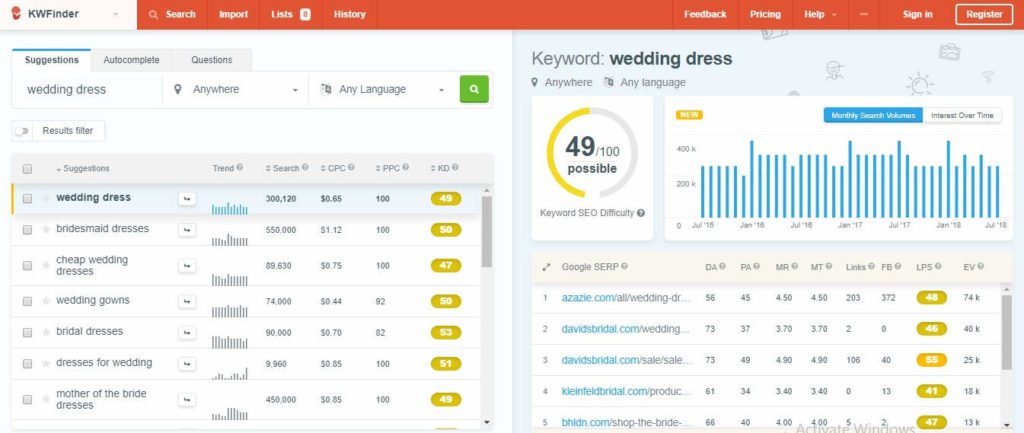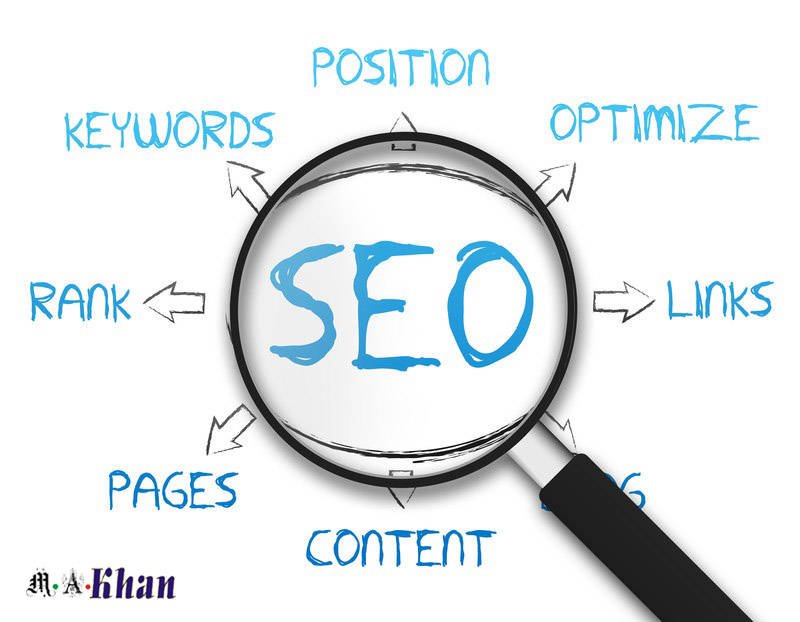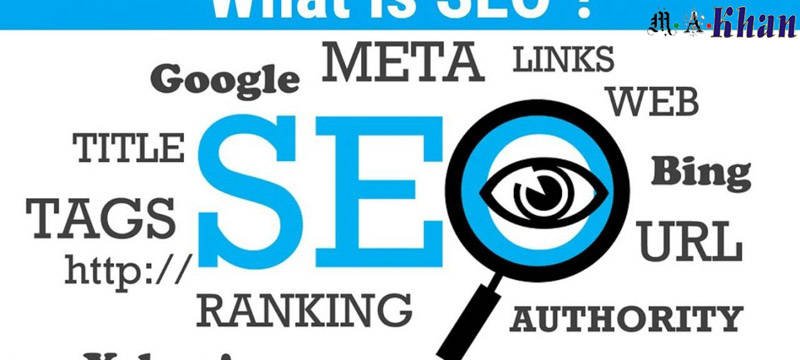SEO, Search Engine Optimization, means search engine optimization and means that technology and content on a website try to make their content on certain search terms visible to search engines like Google.
What SEO really means, how SEO works and why SEO is so extremely important, I explain in this post.
Content
- What is SEO? A definition
- Why SEO? Objectives of search engine optimization
- What is the exact aim of SEO now?
- How does SEO work?
- OnPage SEO
- Technical SEO
- Content Marketing & Search Engine Optimization
- Keyword strategies & keyword research
- Keywords are not enough!
- SEO tools
- OffPage SEO
- Link Building
- Blog article
What is SEO? A definition
Let’s take a look at the definition of Wikipedia definition from Wikipedia to SEO:
“Search Engine Optimization (SEO) refers to measures that serve to make content such as web pages, videos and images rank higher in organic search engine rankings in unpaid search results (natural listings). By deliberately influencing the search engine placement of, for example, videos on the YouTube platform or websites on Google, they can be better listed and generate new reach. “Wikipedia
So SEO is all the measures with which you place your content better in the search results of the various search engines. There are very different approaches – particularly important are the three areas of technology, content, and awareness.
- In the field of technology, one tries to do everything that a search engine can capture content well and classify it as safe and easy to read for visitors.
- The content decides whether search engines classify you as relevant for specific search terms. This is all about quality.
- In terms of quality, external links pointing to content are still an important indicator.
So SEO bundles several areas of online marketing and is, therefore, an overarching discipline.
Search engine optimization turns today mainly to Google. But there are other forms of search engine optimization. Even YouTube is a search engine, this is just about spreading videos. A relatively new form of SEO deals completely with Amazon. Here, Amazon Marketplace retailers are trying to top the list of customer searches on Amazon.
In this article, I mainly write about the optimization of your website content for Google.
Why SEO? Objectives of search engine optimization
The goal of SEO is clear: traffic for your website. Again and again, I experience a great misunderstanding and many believe that it is enough to be found under their name.
At Google, people enter search terms and now also entire sentences to search. Is it really enough for you to be found only when users explicitly search for you or your brand?
SEO is only really exciting when you achieve something completely different. Most people turn to Google for a specific need or question. They want answers and solutions and often have neither a concrete product nor a brand in mind. These users need to pick it up.
Some examples:
- Photographers should be found when customers search for “wedding photographer in Musterertstadt”, but also for terms such as “wedding photography ideas” or “wedding reportage”.
- A hairdresser should be shown as a local search result when users search for “summer hairstyles” or “hairdressing trends” or just for “hairstyle trendsetters”.
Also in politics SEO is very helpful and effective. Here it is just as little if a party or a politician can only be found on Google if they search directly for them.
- Parents who have been looking for a kindergarten on-site for some time are sure to be open to a blog post in which a politician explains his plans and goals on the subject in that city.
- Residents of a road to be redeveloped may be looking to Google for site information – and they may also click on a post where a local party explains why certain decisions have been made on that road.
- Citizens seldom look for a party’s program – but often for specific topics such as environmental protection, health, traffic jams, security, schools, etc. With a good SEO strategy, marketing can be done right here!
What is the exact aim of SEO now?
The goal of an SEO strategy is to find the right people’s needs for your offer and rank them as high as possible on Google and other search engines. If you have managed this, you will continuously get traffic to your website – without having to spend money on advertising.
For this to work we have to achieve one thing above all else: we have to convince Google that our website – or a post on our site – is a relevant and good result for a specific search term.
Read also: SEO Checklist – 15 Steps to Better Google Rankings
How SEO Works?
I’m always asked, “Can you set my website to appear on Google?”. Many seem to have the idea (or hope) that SEO is done in a few clicks. Unfortunately, SEO works much more complex.
Search engine optimization is always a mixture of technical as well as content-related tasks. A distinction is made above all between OnPage and OffPage optimization – that is, between all the tasks that are done on your own website and the tasks that have to be solved outside the website.
OnPage SEO
OnPage is everything that we can set, change and optimize ourselves on our own website – both the technology and the content.
Technical SEO
At Technical SEO, the name says it all, about all the technical issues of search engine optimization. Here, so to speak, the basis is laid down that Google can classify our content correctly and evaluates it as reputable, secure and readable. It should always keep the motivation of Google in mind. Actually, Google could not care less if your website is optimized for mobile devices, how fast it loads, or if it’s safe. But if Google keeps showing its users results on pages that load extremely slowly, cannot be displayed on a mobile device, or even spread viruses, then Google users will not be satisfied with these results. As a result, they will use Google less. So Google has such a big focus on these questions.
However, it is also the task of Technical SEO to facilitate the work of Google and to present your website in a technical structure that Google can easily record and classify.
Some important aspects of Technical SEO are:
- Is the website safe? Is it using SSL encryption and switched to https?
- Can smartphones and tablets make the website easy to read and correct, is the site responsive?
- How fast can the page be loaded, how big is the dataset?
- Are there any scripts that Google cannot read?
- How is the internal linking built, are there broken links?
- If 301 redirects are set up, if necessary, are 404 error messages avoided?
- Is there a clear semantic structure on the page – with matching headings and subheadings?
- Is the source code of the page error-free and as slim as possible?
- Are the metadata optimized and rich snippets created?
[mailmunch-form id=”717586″]
Content Marketing & Search Engine Optimization
Content marketing is the content-related part of search engine optimization. Google always raises the question of what content is relevant to a search term. To create this relevance, the website must also have the appropriate content. In practical terms, when a user searches for “daycare” at Google, a site must clearly turn to daycare for Google to consider as a result.
So you should ask yourself what the right content is about your goals and your offer. Sometimes you have to think a little bit around the corner. Especially political websites and the offers of associations, churches and trade unions should handle this question very thoroughly. In the end, you must always be aware that it’s about collecting users on their Google searches.
See also: Best Convenient and Free Ways to Content Promotion
Keyword strategies & keyword research
For search engine optimization, it is essential to have a good keyword strategy. Keywords are terms that describe a specific topic. If you search on Google, you can enter keywords in the search. It does not have to be single words at all – several words hung together or even whole questions and phrases can be keywords.
A topic always has multiple keywords. Therefore, there should be a whole bunch of keywords in a childcare text – because many people are looking for this topic very differently: kindergarten, kindergarten, daycare, child care, childminder, etc.
Before you write a text, you should research which keywords are important for your topic. The focus is on how often users search for a keyword on Google. There are sometimes big differences. In a text about wedding dresses, I once found that the search volume for the different terms “bridal gown”, “wedding dress”, etc. were extremely different. It can be found out with special tools, such as the KWFinder.

See also: Best Content and Keyword Analysis Tools
Keywords are not enough!
However, it is not enough to put specific keywords in one text alone. Google is now very smart and notices whether a text with the mentioned keywords really has something to do. For a good search engine optimization, it is, therefore, necessary to use many other terms that are part of the subject matter of the keywords. So not only the wedding dress but also the wedding, bride, etc.
So a text really has to deal with a certain topic – only then will it also grow!
SEO tools
There are many tools that make SEO work much easier. Above mentioned I have already the KWFinder, which helps in the search for the suitable keywords. However, the use of Google Search Console is essential. Google itself provides this free SEO tool. You can use it to analyze your website and find many tools for search engine optimization.
OffPage SEO
Off-page, SEO is everything that does not happen on your own website. Google checks the relevance of a page not only based on its own content but also due to the reputation of the page in the network. Here we are therefore immediately on the subject of backlinks.
Basically, this is about the following: The more foreign sites with a link to your website show and say, “Here is a great content!”, The more your site will grow in the image of Google. But beware! Unfortunately, it’s not that easy. Because Google has been cheated here in the past often. That’s why Google now looks very closely at what links to a page show and the quality of these links. Once Google has the impression that this has been helped, they punish your site.
link Building
In order to get many good backlinks, many so-called link building operates. This means that they are specifically looking for ways to get links. There are many dubious methods here – which are now mostly punishable by Google. If you find an offer, you can buy many links for little money, keep away from it! You only hurt yourself.
See also: Link Building Strategies for Niche Sites







